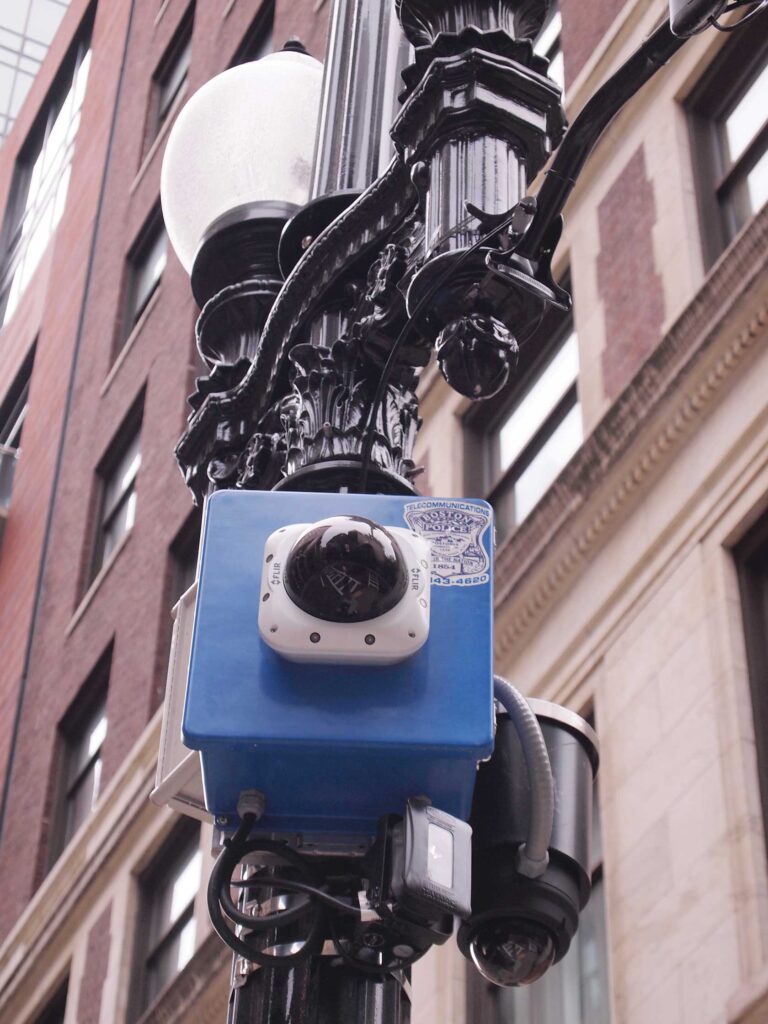
Fatema Ahmad was boarding an international flight at Detroit’s Metropolitan Wayne County Airport when a screener asked her to look into a camera. In an instant, the screener’s laptop captured an image of Ahmad’s face and checked it against an image in a Transportation Security Administration database. The screener waved her onto the plane.
What may seem to some like a simple transaction made seamless by recent advances in technology appears to Ahmed as a troubling new trend.
“At the national level, I think we’re in a rapid slide into a dystopian surveillance state,” she said. “I’m worried.”
Ahmad, who heads the Muslim Justice League in Boston, is not alone. Last month U.S. Rep. Ayanna Pressley and other members of Congress and the Senate renewed a push to ban U.S. government use of facial recognition software and other biometric technologies, citing threats to privacy and civil liberties and the technology’s proven inability to provide accurate matches for people with dark skin.
The Facial Recognition and Biometric Technology Moratorium Act, first filed in 2021, would bar federal agencies from using such technologies unless Congress passes an act that specifically authorizes such a use.
Indigenous, Black, Latino and Asian Americans are more than 100 times more likely than whites to be misidentified than are white males, according to a study released in 2019 by the National Institute of Standards and Technology.
“Facial recognition technology is fundamentally flawed, systemically biased, and disproportionately targets Black and brown communities that are already over-surveilled and overpoliced,” Pressley said in a statement. “By passing this bill, we can prevent government agencies from using this faulty technology and affirm the right of every person in this country to live freely of unjust and discriminatory surveillance by government and law enforcement.”
Currently, 1-in-2 Americans is already in a law enforcement facial recognition database, according to a report by the Georgetown Law Center on Privacy and Technology.
Only 16 states allow the FBI to use automated searches of police department mugshots. Massachusetts does not, but policies on facial recognition differ within the state depending on the jurisdiction.
Boston, Cambridge, Worcester and Springfield have passed bans on police use of facial surveillance technology. The Massachusetts State Police have refused to confirm or deny whether they are using facial recognition technology.
As facial recognition and biometric technology developed in recent years, the Boston Police Department invested heavily in security cameras, with little oversight from elected officials. In 2021, then-Mayor Kim Janey signed into law Boston’s ban on police use of facial recognition software and an ordinance that requires City Council approval for the acquisition of any new surveillance technology.
The ordinances came after the Boston Regional Intelligence Center — an agency that aims to share information between local police departments and state law enforcement and federal agencies such as the FBI and U.S. Immigration and Customs Enforcement (ICE) — sought to link 1,000 cameras used by BPD and other departments into a single, searchable network. The move would have given federal authorities access to cameras in Boston, Brookline, Cambridge, Chelsea, Everett, Quincy, Revere, Somerville and Winthrop.
At the national level, the FBI is thought to be collecting facial and biometric data — such as walking patterns, voices and iris patterns. The American Civil Liberties Union and the ACLU of Massachusetts in 2019 sued the FBI and other related agencies to turn over records on their use of face recognition technology. Documents obtained by the ACLU revealed that the FBI has been testing facial surveillance technology on Americans in subways, street corners and other places of public accommodation since 2014, as part of its Janus Project.
The project was designed, according to FBI documents obtained by the ACLU, with the aim of “radically expanding the scenarios in which automated face recognition can establish identity.”
Kade Crockford, director of the Technology for Liberty Program at the ACLU of Massachusetts, says the FBI’s program, which Pressley and her colleagues are trying to ban, is worrisome.
“This is basically our worst nightmare,” Crockford said. “This is the style of facial recognition that the Chinese government has been using, that the Russian government has been using.”
Ahmad noted that such technology has been used on people protesting the so-called Cop City training facility being planned in Atlanta. Demonstrators there have been hit with charges of domestic terrorism.
“It’s a pretty fast descent into the government being able to identify where you are at any time,” Ahmad said. “It might not happen as quickly as it did in China, but we’re already on our way.”
The push for a national ban is sponsored by representatives Pressley, Pramila Jayapal of Washington and Rashida Tlaib of Michigan, and senators Ed Markey and Elizabeth Warren of Massachusetts, Bernie Sanders of Vermont, and Jeff Merkley and Ron Wyden of Oregon — all Democrats.
But Crockford says opposition to increased surveillance cuts across partisan lines. In past hearings on the technology, conservative Republicans such as U.S. Rep. Jim Jordan of Ohio have expressed opposition to U.S. agencies’ expanding use of surveillance technology.
“People all over the political spectrum believe there ought to be checks and balances in place to protect people’s basic civil rights,” Crockford said. “It’s not a partisan issue.”







